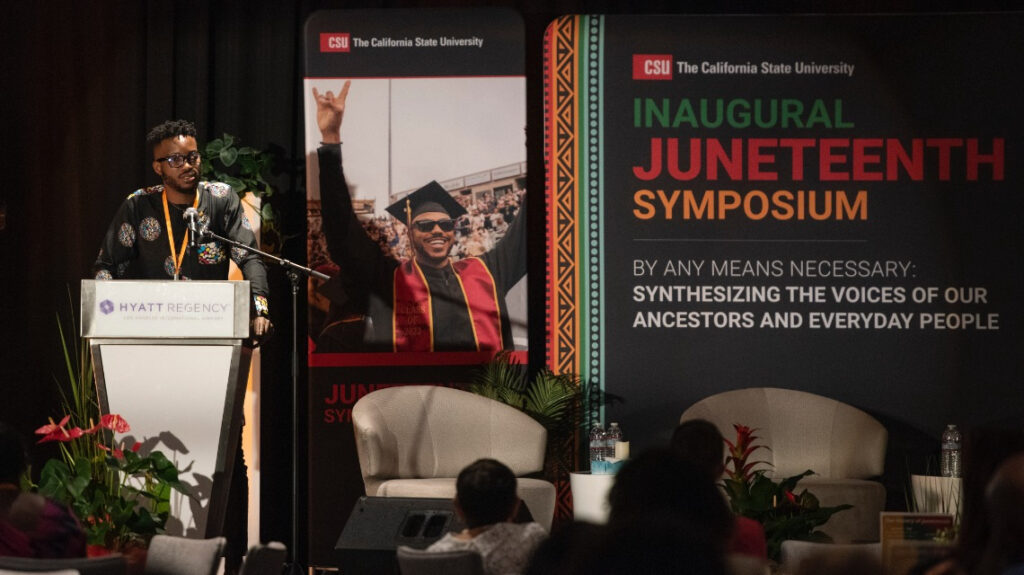
Source: Long Beach Press-Telegram
The two-day event – titled “By Any Means Necessary: Synthesizing the Voices of Our Ancestors and Everyday People” – aims to engage and support Black students in their pursuit of college success, prosperity and self-fulfillment, Cal State officials said.
CARSON – Discussion focusing on higher education in the Black community, the meaning of celebrating Juneteenth and the importance of amplifying diverse voices on Cal State University campuses are some of the key points being discussed during the Inaugural Juneteenth Symposium, hosted by Cal State Dominguez Hills and livecast throughout the CSU system.
The two-day event – titled “By Any Means Necessary: Synthesizing the Voices of Our Ancestors and Everyday People” – aims to engage and support Black students in their pursuit of college success, prosperity and self-fulfillment, Cal State officials said.
“This event was a long time coming,” said, the CSU system’s interim chancellor, during the first of the event’s two days.
“Many of the CSU campuses have celebrated Juneteenth for years with performances, displays, lectures, symposiums that recognized the rich history and achievements of our Black and African American students, faculty and staff,” Koester said. “But this is the first time that we have linked arms at the system level to evoke systemic change.”
The panels on Wednesday and Thursday feature a lineup of national figures and scholars. Also on the agenda: performances by CSU students and other special guests.
On the first day of the symposium, more than 600 attendees attended in-person and at least another 1,300 were online watching the livestream.
William Franklin, vice president of student affairs at CSU Dominguez Hills, opened the first session to describe the “voyage” of the event, which would include discussions on how to serve, celebrate but also interrupt and instigate the community.
Opening remarks were also delivered by Obioha Ogbonna, president of CSUDH Associated Students Inc. Ogbonna described how his views changed about celebrating Juneteenth since he arrived from Nigeria to study cyber security.
“What does Juneteenth mean to me now? It’s an opportunity to meet and connect with my brothers [and] sisters here in the present and look back at the past at what separated us,” Ogbonna said. “I hope we learn a lot from this symposium and we get closer to reconnecting the link that was broken.”
Juneteenth is celebrated on or around June 19 each year to commemorate the emancipation of enslaved people in the U.S. The holiday was first marked in Texas, where in the aftermath of the Civil War, slaves were declared free under the terms of the 1862 Emancipation Proclamation.
Earlier this year, President Joe Biden signed the Juneteenth National Independence Day Act, giving federal employees the day off to celebrate the new holiday. As celebrations have blossomed in popularity in recent years, some cities and other local entities have also decided to make the day an official paid holiday.
Framing the discussion during Wednesday’s symposium was Thomas Parham, president of CSU Dominguez Hills. Parham emphasized that true societal change will not be possible until Black voices are not heard and become enmeshed in the processes of government.
“If Juneteenth is to have real meaning and not simply represent another programmatic initiative that we can feel good about because we put it on and check the box, then our efforts over these next two days must integrate the biases and assumptions that we bring with us into the academic spaces we occupy,” Parham said.
“Our efforts must develop new and substantial programs that address the true needs of African descent students, staff and faculty and senior administrators that we claim to care about,” he added.
Keynote speakers include: Tyrone Howard, professor of education in the School of Education and Information Studies at UCLA; Shaun Harper, a professor at USC; and Cornel West, author and professor emeritus at Princeton University.
West described how Black excellence comes with learning history, and working on finding a voice today to forge changes in the community.
“When you get deep enough into Blackness you have a human connection that makes you international, global and universal rooted in the local,” West said in his speech. “And you can’t do that if you don’t find your voice.”
To virtually attend the concluding day of the CSU Inaugural Juneteenth Symposium on Thursday, visit www.calstate.edu.